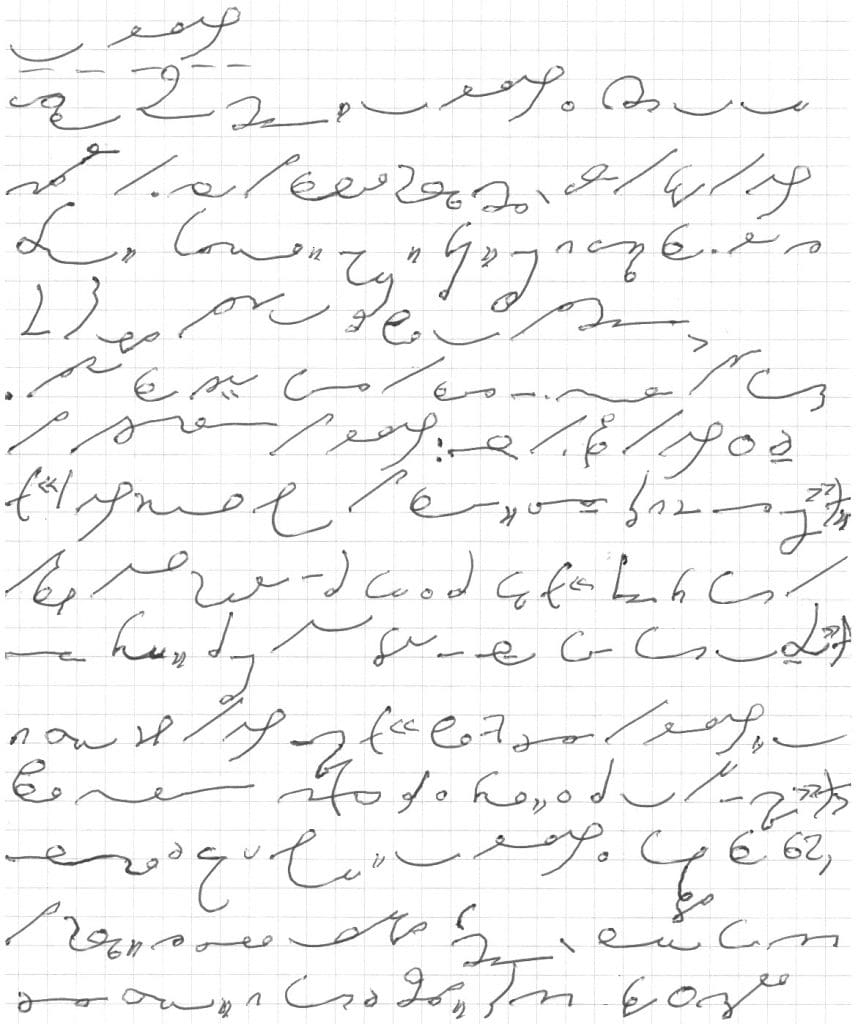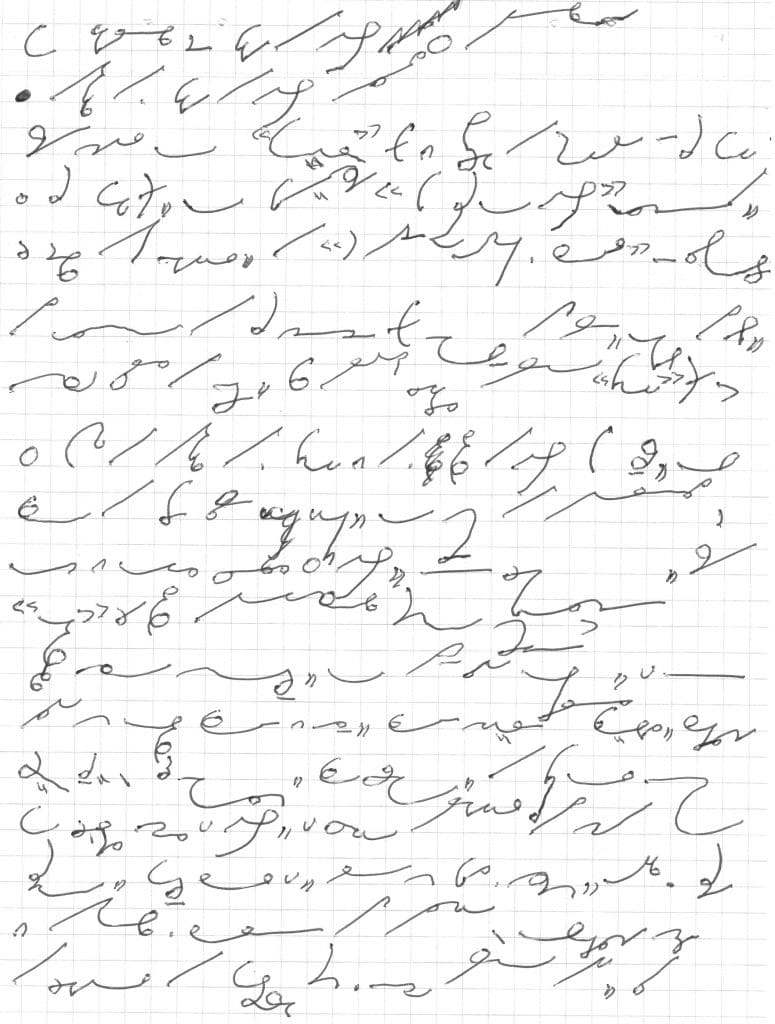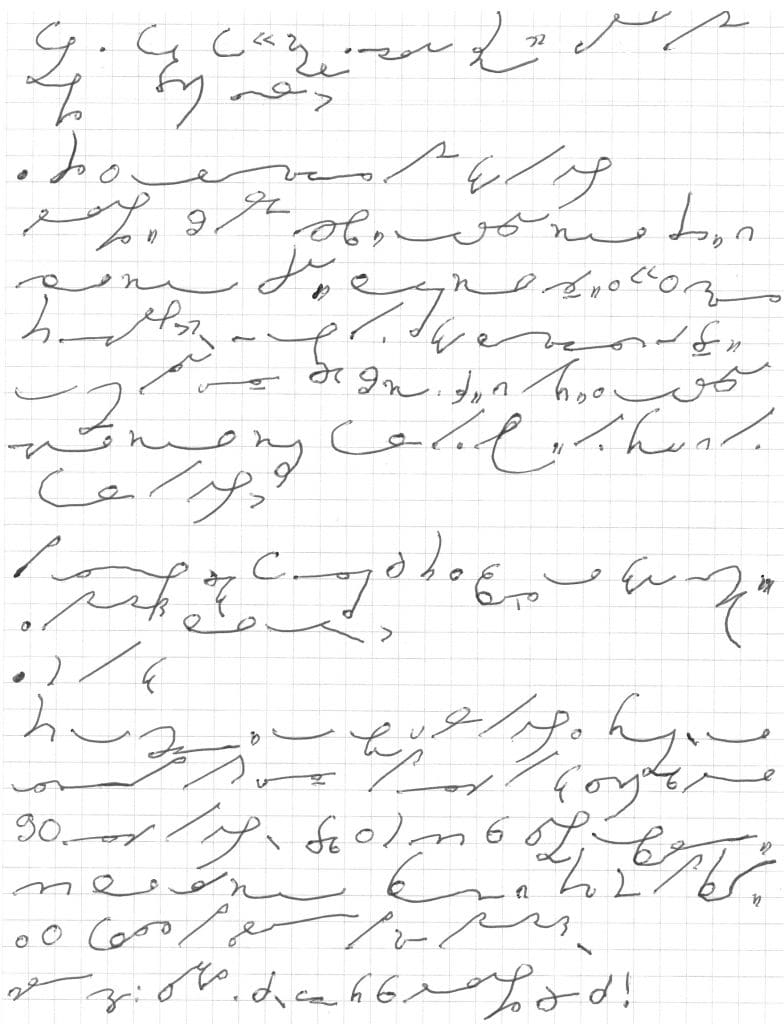Hello,
My attempt at transcribing a French newspaper article on working from home (do you call this telework in English?). Please let me know if you find mistakes or possible improvements. Thanks!



The Gregg Group was founded 22 May 2004, prompted by the lack of online shorthand resources. As the primary use for shorthand — business and legal recording — has waned in recent decades, we generally acclaim the skill as a hobby or personal tool. The purpose of the group is to promote the use of Gregg systems of shorthand by providing advice to beginners, support for students, and an association of users of this efficient, attractive, and enjoyable method of writing.
Hello,
My attempt at transcribing a French newspaper article on working from home (do you call this telework in English?). Please let me know if you find mistakes or possible improvements. Thanks!



You must be logged in to post a comment.
I forgot I should probably specify that I have adopted the double-comma suggested by LVW, although my messy pen has turned them into blobs.
I have also inverted the NK and NG signs (I use the short one for NK and the long one for NG because I’m convinced it makes a lot more sense in French).
Lastly, I got used to writing dif/def as a slightly modified div/dev blend, with the second part halved to the length of an F. I find that the official dif, def, div, dev blend that forces you to guess if it’s i or e, and if it’s f or v, when it is on top of that followed by a small circle that again makes you hesitate between e and i, really slows down the reading. So I wanted at least to get rid of the F/V hesitation and I so far I can’t see the harm in that, but please let me know if you do!
I admit: too long for me… So far: 'Au moins, je sais où sont mes enfants…' You have written: 'Au mien…'
For 'plébiscité', I would have written: 'p-l-e-b-i-s-t-e'. To write the second 'i', you have made a 'double s'…
A point of style… there is a lack of difference in the curves between 'k' and 'l', in 'kl'… like in 'clin d'œil'.
For 'ng' and 'nk', I'm of the same opinion: I don't like very much these long 'nk' (particularly ugly in 'oncle'). Nevertheless, I think it's minor compared to the horrible 'tout le monde'. So, for me, I remain traditional… 🙂
I'll read the rest later… certainly… 🙂
Yikes, why did they adopt such a long outline for tout le monde? In Spanish, the "l" is not written.
That's an idea: removing the 'l'… I thought crossing 't' and 'm' would be a good idea but your solution is more elegant.
"Telecommuting" in English.
I'll take a look. But I'm curious: is "feng shui" pronounced in French as if it were a French word (and not "fung shway")?
Almost like it's a French word. It's 'feingue chui'… 🙂
I pronounce it more like "fangue choui" (if written the French way), I guess no one in France really knows what the proper pronunciation should be!
Here are some observations:
First Plate
Line 6: "Twitter" should be t-underscore e-t-r. Also, I would have phrased clin d'oeil by eliminating the d.
Line 8: Table has a -ble ending, so it is written t-a-b.
Line 9: After the opening parenthesis, does that read J'en peux? If so, phrase it as j-n-p (peux, peut, peu is a brief form).
Line 10: In peindre, the e goes inside the curve formed by the p and the nd.
Line 11: There is no a in station: right s-t-tion. (And incidentally, I don't like the way encore is written in DJS. In Anniversary and Simplified it is written as n-k-oo hook-r: I would probably use n-k, the brief form for inclure, since encore is much more frequent word.)
Line 13: Malgré is written correctly, but that's another word that I would use the brief form from previous versions, m-a-g-r-e. Also, although plebiscité is written correctly again, the turn on the s makes it look like a ses. To avoid that, I would eliminate the circle between the b and the right s: p-l-e-b-right s-e-t-e.
Second Plate
Line 6: Répartition does not have an e.
Line 7. Intrusion is written as disjoined n-tion. So, d'intrusion you just add a d to the disjoined n. Also, I find it odd that they adopted opinion as o-p-n, but then proceeded to write all of the derivatives of opiner with the e circle between the p and the n. I would eliminate that circle altogether.
Line 8: Since you are making a distinction between dev and def, why are you blending def? Just write d-f-o hook for défaut (without the blend). There are words with the def in English that we don't blend for legibility (for example, "deform"), so just do that.
Line 9: I would've phrased salle de bain (no d).
Line 11: There is no a in délocalisé.
Line 12: Quel qu'il soit: k-k-l-left s-underscore a. Also au même can be phrased as o-hook-mem blend, but keeping the hook in its natural position (not turned to the side).
Line 14: Meuble has the -ble ending (m-oo hook-b).
Third Plate
Line 1: S'offrir is written with the f resting on the line, not the s. Also, there is no e in au-delà.
Line 3: In the phrase l'ergonomie, the o between the g and the n is written on the side.
Line 4: Since you phrased dans son, write it with the right s so that we know the word is son. In l'ordinateur, you wrote it like in Simplified Gregg, with the o-hook turned to the side before the r. In DJS, the o-hook retains its position.
Line 5: You forgot your favorite DJS ending in the word consommer: k-right s-m-e (no o-hook).
Line 10: There is no a in réglage. Also, the p in s'épargner lies on the line.
Line 15: l'appartement: l-a-p-t-m
Line 18: on peut: o-n-p (it's a phrase).
Thank you both for your feedback! Very useful as usual… it’s crazy how many mistakes have escaped my attention, most of your corrections seem really obvious and yet I proofread the whole thing twice before posting it!
@Carlos
1st plate, Line 9 : I meant to write Je n’en peux plus, and so attempted to write je n’en with J-N-N. The original text actually read "j’en peux plus" (informal French) which I thought was impossible to transcribe in an understandable way.
Regarding encore, it’s funny because I wrote it as you describe, then corrected myself and added the A and replaced N-K with the slanted N. I think attributing the incl. short form to encore does make perfect sense, given their respective frequencies nowadays.
Malgré : Yes I did feel uncomfortable with all those curves and actually searched for a brief form in my manual but didn’t find it.
Regarding blending def, I was just worried that "unblending" might indicate they are two separate words, like "de faire", as I noticed that usually unblended forms mean you’re dealing with two words. I didn’t know about deform. Could you tell me a bit more about why deform is not blended?
All the rest of your comments are clear. Thanks again, that was great!
You're welcome! In English Anniversary, deform is not blended to make the for- prefix distinct. However, I checked again and they are blending in English Simplified and DJS, so forget about my suggestion.